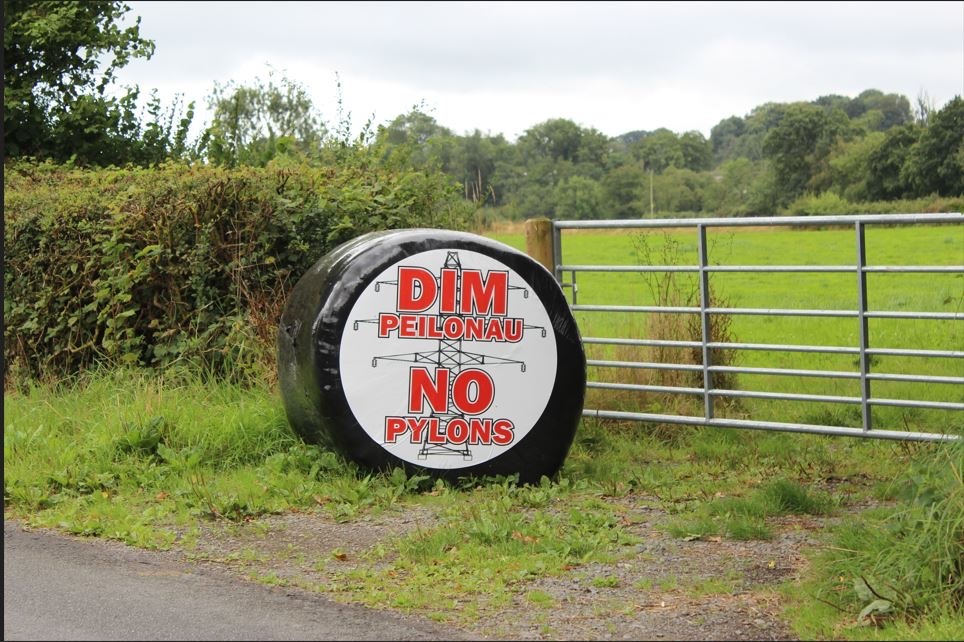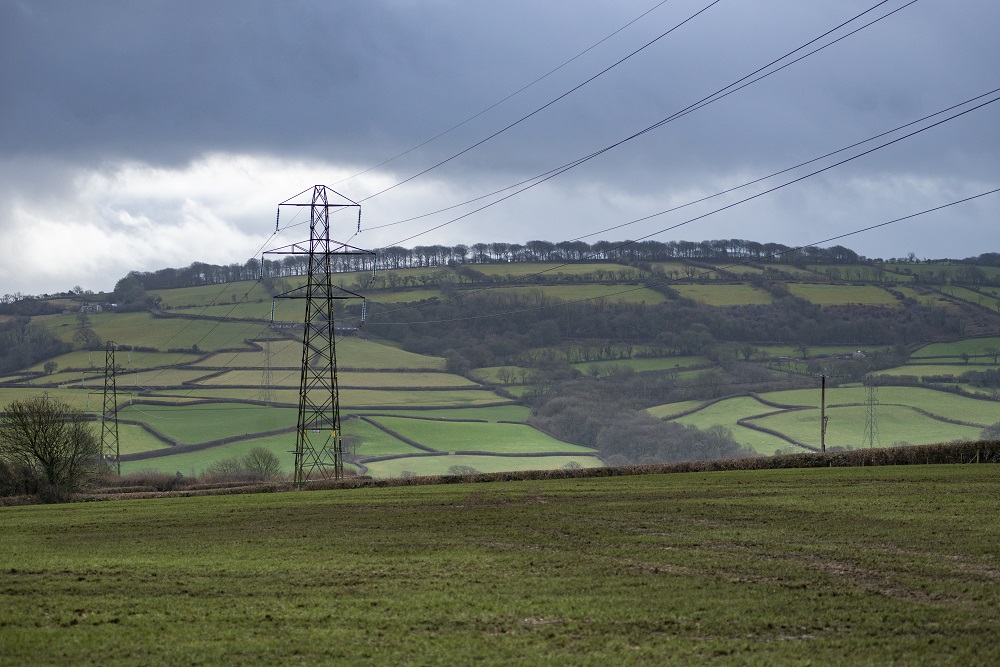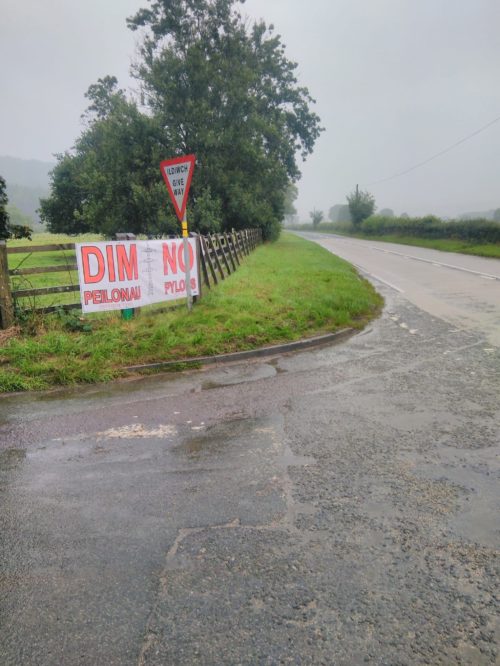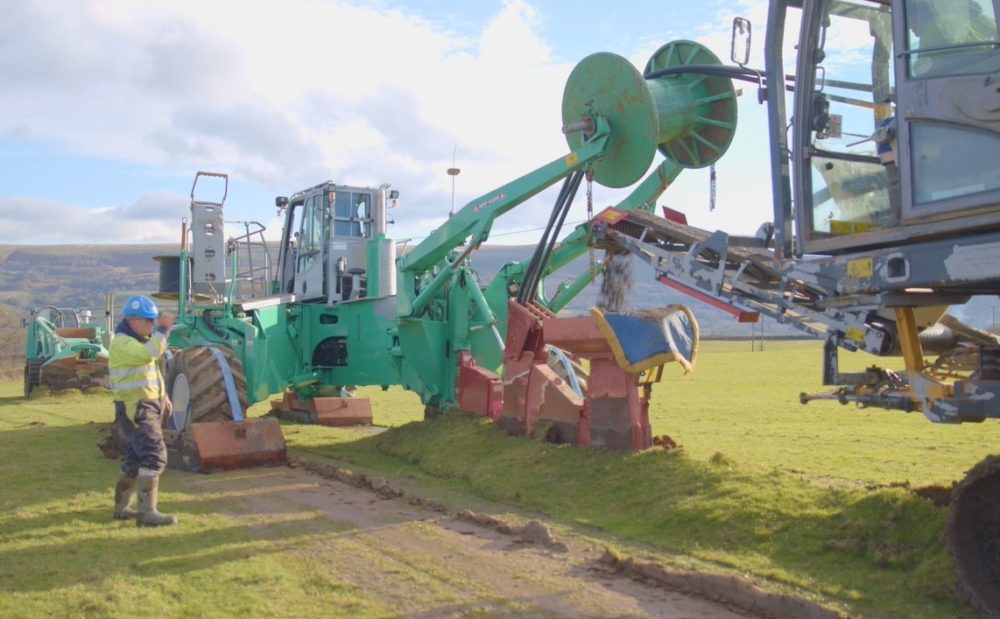The communities resisting plans for 60 miles of power line across mid-Wales

Richard Youle, local democracy reporter
Many landowners along the route of a overhead power line proposed through Carmarthenshire are not allowing the company which wants to build it on their land, it has been claimed.
Surveys are a key part of assessing ground and environmental conditions ahead of significant infrastructure projects and Green GEN Cymru – the company which wants to build the overhead line – said its “overwhelming preference” was for voluntary agreements.
Statutory notices requiring access have, however, been issued to some landowners. While Green GEN Cymru, farmers and local politicians are the main players involved in this debate, ripples have spread to the Senedd, to pension funds – and questions about how to scale up the decarbonisation of the UK’s energy system spring to mind.
Pylons
As things stand most of the proposed 97km power line from Radnor Forest, near Llandrindod Wells, north of Carmarthenshire, to a substation south of Carmarthen would run overhead on pylons, crossing the county’s agricultural heartland – an area also popular with tourists. The 132,000-volt cable would transmit electricity from planned wind farms, generally following the line of the Towy Valley, to connect to the grid.
Following a public consultation Green GEN Cymru has agreed to bury a 5.5km section underground where it crosses the River Towy near Llanarthne to reduce potential landscape effects. It said the undergounding of cables was several times more expensive than the overhead option and that the infrastructure it built had to be efficient and economical.
Pylon opponents who have spoken to the Local Democracy Reporting Service said they didn’t object to renewable energy schemes and acknowledged the grid had to be upgraded.
But they have urged Green GEN Cymru to undertake a life-cycle cost analysis of an undergrounding technique called cable-ploughing. Instead of digging wide trenches, this technique involves machinery cutting a slit in the ground and laying a cable or duct as it goes along with the disturbed ground flattened and reinstated as part of the process. The completed route is then mapped with a GPS system. A Carmarthenshire company called ATP Cable Plough, near Pencader, specialises in this method and has said it can lay a kilometre of the type of power line proposed by Green GEN Cymru – sometimes more – in a day.
Cable-ploughing
Dyfan Walters, co-chairman of Llandovery pylon steering group, a campaign group, said he was not allowing Green GEN Cymru associates on his farm near Llandovery. He said cable-ploughing the power line would overcome landowners’ objections.
“The vast majority have refused access, knowing full well we could end up in court,” he said. “I think that shows the strength of feeling. I don’t think it would be a great look for Green GEN if they were to take 300 farmers to court.
“We have offered to work with them to get these cables underground. If they seriously considered it we would work with them and open our gates. With cable-ploughing the land is reinstated the next day or following day.”

There is no suggestion that Green GEN Cymru intends to round up farmers and take them to court. It said all landowners have been and continued to be offered meetings with it and its land agents.
Mr Walters added: “We fully understand there is a need to ‘future proof’ the country. We understand we need to wean ourselves off fossil fuels and find other sources of energy. We fully appreciate the grid infrastructure needs to be improved, particularly in Mid Wales.
“But this power line won’t do anything to improve our (landowners’) infrastructure. It’s a motorway basically. Agriculture and tourism are key economic inputs in this area. We would much prefer to keep it beautiful.”
Mr Walters also claimed that pylons devalued agricultural holdings and that building them put land out of action for a lengthy spell.
Cost
Given that businesses and consumers ultimately bear at least some of the cost of grid upgrades, I asked what would happen if Green GEN Cymru agreed to underground the power line but spent a lot more money doing so.
“It’s a valid point,” replied Mr Walters. “I just wish Green GEN would tell us how the cost of cable-ploughing would compare.”
Green GEN Cymru has said that undergrouding cables would cost seven to 10 times more than the overhead option. The conventional way of burying cables is to dig a large open trench, disrupting all uses of the land during construction and, for example, restricting future tree-planting either side to avoid root systems interfering. The points where the sections of cable are joined together also require above-ground infrastructure. Rocky, hilly and wooded land pose problems.
Mr Walters said he and others were of the view that undergrounding was not as expensive as suggested, and that cable-ploughing was less expensive still. But he added: “We are not experts in this field.”

Farmer Cled Richards has not allowed Green GEN Cymru representatives onto his land south-west of Llanarthne, where he has 10,000 hens and also some sheep. “I would say that the majority of landowners are not allowing access,” he said. “I would say the pylons are strongly opposed.”
He added: “The first correspondence I had from Green GEN was in January 2023 and I did respond to that. I felt as if I gave them tangible reasons why I didn’t want to give them access. There were specific biosecurity reasons – avian ‘flu was around.”
Mr Richards claimed the initial proposed route of the Towy-Usk line had it going over the building where he and his staff worked. He said: “I wouldn’t want me and my staff to work directly underneath.”
He claimed the revised overhead alignment was within 15 metres of the initial one and that Green GEN Cymru should look at undergrounding – cable-ploughing in particular.
“If it (cable-ploughing) is more expensive than pylons, it’s still such a long lifespan project,” he said. “Sometimes there are greater capital costs when it’s the correct decision. They’re a private company, they should make the correct decision, accept it and write it off over a longer period.”
Mr Richards, who is a member of the Llanarthne pylon steering group, said he was not worried about where the access impasse could go. “I don’t feel as if we have done anything wrong,” he said. “I don’t have an issue being challenged.”
Farmers have been known to bridle when they perceive people are telling them their job – was this a case, I asked, of farmers advising engineers how to do their work?
“The comeback I would say on that is cable-ploughing looks as if it’s a low-impact technique and quick to implement,” said Mr Richards. “Fair enough, we don’t know exact costs, we are not experts, I accept that.”
Carmarthenshire Council’s cabinet member for resources, Cllr Alun Lenny, said in a letter this summer to a public sector pension fund that the council had refused Green GEN Cymru onto its land. Council leader Darren Price said, following legal advice, the position was that only tenants of its land could refuse or allow access, not the council itself.
Cllr Price, of Plaid Cymru, has written to Green GEN Cymru pressing for the whole 97km Towy Usk route to be undergrounded to protect the landscape. Although the rural constituency affected is natural Plaid one, Carmarthenshire councillors have unanimously passed a cross-party motion saying they shared the concerns.

Cllr Price’s letter welcomed work being done by the Welsh Government and Green GEN Cymru to compare pylon costs to alternative methods. The Welsh Government’s position is that new power lines should be laid underground where possible and that a balanced view must be taken against costs which could render otherwise acceptable projects unviable. It also said that updating Wales’ grid was essential.
Referring to the work cited by Cllr Price, a Welsh Government spokeswoman said an independent advisory group has been set up to agree principles and create an evidence base for new electricity networks. “That group is considering the evidence base on the cost of undergrounding,” she said.
Energy regulator Ofgem has a role in the decision-making process for new transmission projects. It decides whether the overall funding case is efficient and delivers value for the bill payer. It said if a particular project proposal leads to additional costs to bill payers compared to alternatives, the developer has to justify that cost.
Wales and the UK’s grid system has to be updated to handle the extra power needed for the electrified transport, heating and industrial networks of the future as well as meeting our current needs.
The Energy Networks Association (ENA), an industry group, said UK electricity demand was forecast to rise by 64% between 2030 and 2035, partly to meet clean energy targets. It is an astonishing figure. Network operators, said the ENA, were due to invest £31 billion in the next few years.
Last week the BBC reported that nearly 620 miles of new power lines were needed in Britain to hit the Labour Government’s target to decarbonise electricity by 2030, on top of nearly 3,000 miles of new undersea cables connecting offshore wind farms to the grid.
Officials from the newly-created National Energy System Operator (NESO), which plans Britain’s energy system and operates the electricity network, said achieving the 2030 target was a huge but achievable challenge, and that it would cut the link between electricity bills and volatile international gas prices. It said this rapid scale-up would require investment of around £40 billion per year, and added: “How costs translate to customers’ electricity bills will depend on policy design and market dynamics that we do not attempt to predict in this report.”

Back in Carmarthenshire, cable-ploughing company ATP, which has laid undergound power lines in Holland, Scotland and England, has responded to an email from Huw Irranca-Davies, Wales’s cabinet secretary for climate change and rural affairs, about the technique. ATP said it had to be careful not to disclose cost comparisons for commercial reasons, but said the “costs and impact from the old method of open trenching are significantly greater than the method of cable plough/drilling”.
The email from ATP managing director Jason Thomas said he would be happy to attend a joint Senedd committee session to share his thoughts.
Another question in this debate is whether pylons would deter tourists from visiting an area. George Reid, chairman of a group called South West Wales Tourism Partnership, said he wasn’t aware of detailed research on this. “It’s about the perception of an area,” he said. “To have massive steel structures going through it is not desirable. Tourism is fragile at the moment. Farming is under a lot of pressure.”
Mr Reid, who runs a bed and breakfast businesss between Carmarthen and Pencader, also said power had to go where it was needed. He said: “If the lights were to go off, we would all be saying, ‘Where’s the electricity?’ I think we need more government policy on this. We should also be supporting more insulation of homes and demand reduction.”
Powys, as well as Carmarthenshire, would be affected by the Towy-Usk power line. Powys Council said it was allowing Green GEN Cymru onto its farms for surveys to be carried out. But it added that this didn’t imply support for the proposal.
Green GEN Cymru, which is registered in Cardiff and plans to invest £500 million in new infrastructure, is currently assessing responses to a second consultation on the 97km Towy-Usk project. It will then come up with a final design and a draft environmental statement, which also be subject to a consultation, prior to submitting an application to Welsh ministers for consent. It said a community investment fund would be part of the scheme, benefiting those closest to the infrastructure and communities along the route.
Access
The Local Democracy Reporting Service asked Green GEN Cymru about the issue of access onto land, whether it has re-assessed the cost of undergrounding cables – in particular cable-ploughing – and if so whether it would be technically and economically viable to underground more or even all of the route.
The company, which has also proposed a second north-to-south power line west of the Towy-Usk one, said: “Whether it is undergrounding cables, wood poles or lattice towers, across our projects all suitable technology options are being considered, reviewed and utilised, and typically on a network a combination of technologies would be used.
“The final designs for each specific project will include a mix of infrastructure that will be considered in terms community feedback, terrain, environment, land use, operation and maintenance, the power being transferred across the network, as well as cost.
“Evidence throughout the industry points to undergrounding being significantly more costly and we note and welcome the Welsh Government’s review into the subject.”
On land access, it said: “Land surveys are essential to establish all constrains along the route including environmental as well as ground conditions for engineering both overhead and underground lines. Green GEN Cymru’s overwhelming preference is to seek voluntary engagements with landowners and as such we and our external land agents have been actively engaged in negotiating voluntary agreements with landowners since early 2023.
“Unfortunately we have been unable to reach voluntary agreements with all landowners, and some as a result have recently received statutory notice under section 172 of the Housing and Planning Act.”
It said all landowners continued to be offered meetings with Green GEN Cymru staff and external land agents, and added: “It is always stressed that agreeing to surveys in no way restricts land owners ability to respond to project consultations or express their views on our proposals.”
Whether that persuades landowners in Carmarthenshire to open their gates remains to be seen.

Llandovery councillor Handel Davies said it was his understanding that resistance was “virtually unanimous” because cable-ploughing didn’t appear to be a serious option.
The perception, he said, was that the community wouldn’t benefit from the Towy-Usk project. “There needs to be a significant, recognisable benefit locally,” he said.
Cllr Davies also wondered if the two north-to-south power line routes proposed by Green GEN Cymru would be joined by others criss-crossing the landscape in the future.
“The compensation being talked about is going to be outweighed by the impact,” he said.
Support our Nation today
For the price of a cup of coffee a month you can help us create an independent, not-for-profit, national news service for the people of Wales, by the people of Wales.






Only time I notice pylons is when people moan about them. Most of my life they are not an issue. And they transport electricity which means I get light and heat, which is nice.
Obviously you don’t live anywhere near the major over ground network. When there’s a far cleaner alternative you’d go for it wouldn’t you ? Isn’t that what wind and solar power is all about? It’s certainly not about lower cost as we the customers are not seeing any return on the turbine building thus far. Or is your hatred of agriculture showing again ?
Undergrounding is not cleaner by any stretch of the imagination. To run a cable circuit (and you can’t run them for massive distances), you need a 20-35 meter wide excavation per circuit, then joint bays every 250m, then sheath voltage limiting kiosks every few hundred metres. Farmers can be restricted in the use above that cable route and in the event of a cable fault, they will have contractors in their fields for weeks. Overhead lines are better for many reasons, not just the freedom they give farmers, but also the reduced outage time due to faults. Overhead line faults… Read more »
Read the article, read about cable ploughing. Then come back and revise your post.
Yeah, I do.
Agreed, all people in Wales do is moan about every type of power generation and infrastructure. Not sure they deserve electricity to be honest!
You cannot underground cables for an appreciable distance, and they have many times the costs and operational risks than overhead lines. Where underground cables are used, farmers can be restricted in the use of land, and when cables fault they can take months to repair. The cable plough is not acceptable at 132kV and above as there are more stringent requirements for the undergrounding of high capacity HV cables. People need to understand that overhead lines are preferred for many reasons, many of which are to do with the electrical characteristics of cables in comparison to overhead lines.
Yes underground HV cables are extremely expensive to install and when faults occur a nightmare to fix, I know I work in the industry.
Rather surprised that the farmers aren’t telling us that pylons will be the death of family farms and that the nation will starve as a result.
Put the cables underground.